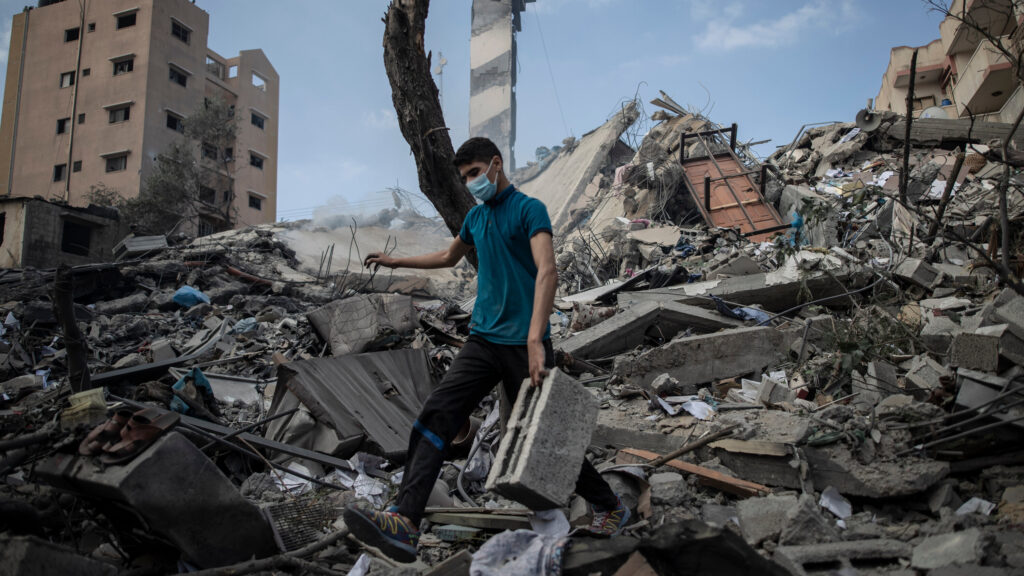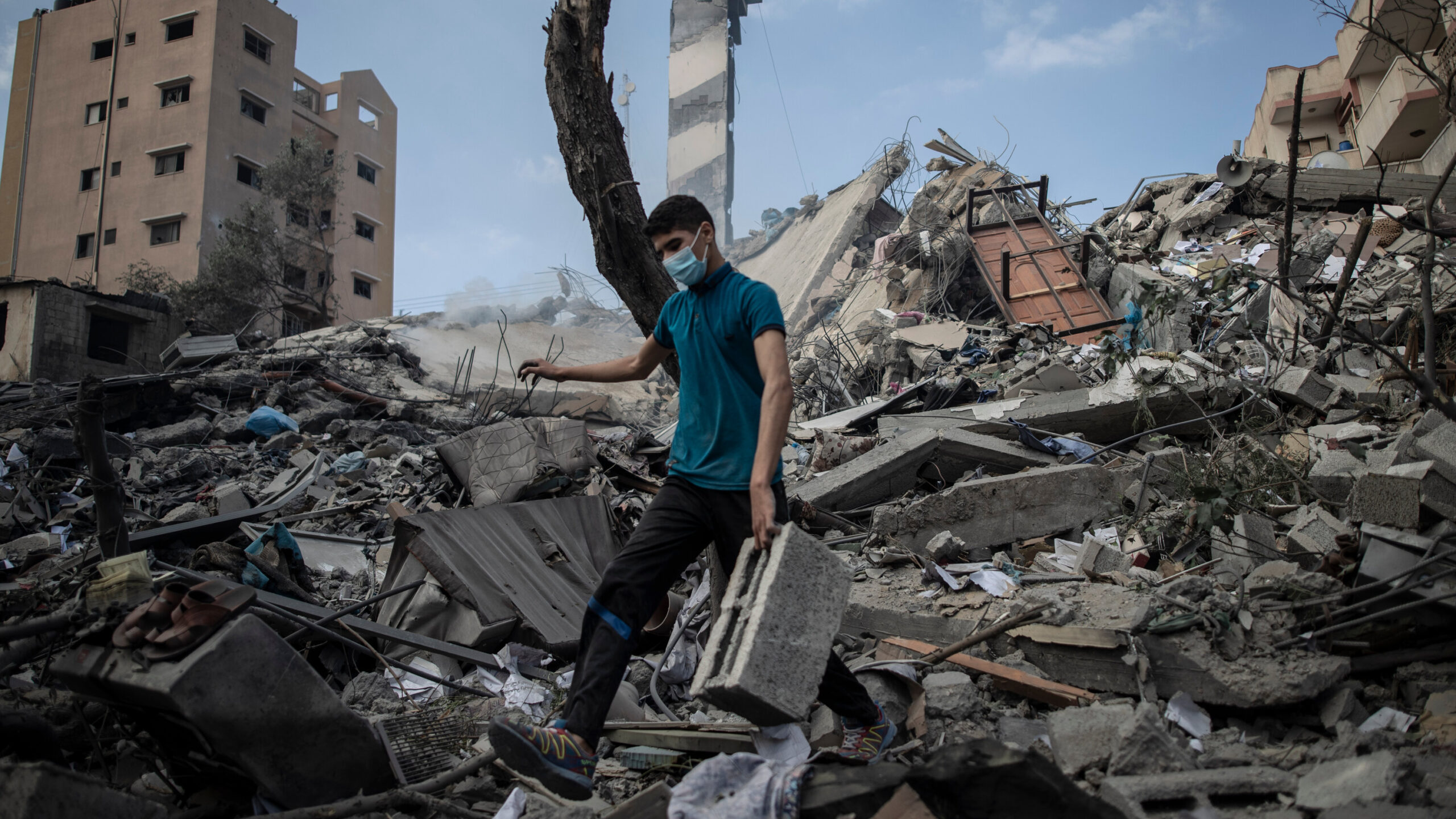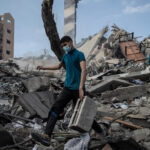
As the war between Israel and Gaza rages on, the human toll continues to grow. According to the World Health Organization (WHO), at least 22,000 Palestinians have sustained life-changing injuries, with a quarter of those wounded left facing lifelong physical and psychological challenges. This latest figure underscores the immense humanitarian crisis unfolding in Gaza as relentless bombings and military assaults continue to devastate the region.
One of the most harrowing incidents in recent days has been the bombing of the United Nations-operated al-Jaouni school in central Gaza, which has been targeted five times since October. The most recent attack resulted in the deaths of at least 18 people, including women and children, whose lives were tragically cut short. Witnesses on the ground describe the horrifying scene, saying “women and children were blown to pieces” in the assault. The devastation has left Gaza in a state of despair, with the civilian population bearing the brunt of the violence.
22,000 Life-Changing Injuries: A Grim Humanitarian Crisis
The WHO’s latest report paints a bleak picture of the consequences of Israel’s ongoing military operations in Gaza. Out of the tens of thousands of Palestinians injured, approximately 22,000 people have sustained injuries that will permanently alter their lives. These injuries range from amputations and severe burns to spinal cord injuries and debilitating psychological trauma. The already overstretched healthcare system in Gaza is struggling to cope with the sheer number of patients, with hospitals facing severe shortages of medical supplies, equipment, and staff.
Many of those injured are women and children, a fact that highlights the indiscriminate nature of the violence. The inability to provide adequate care for these victims not only exacerbates their suffering but also places additional pressure on Gaza’s healthcare system, which has been crippled by years of blockade and conflict. Rehabilitation for those with life-changing injuries is almost non-existent, leaving many without hope of recovery or return to normal life.
The Tragic Bombing of the UN-Operated al-Jaouni School
One of the most shocking developments in the conflict has been Israel’s repeated bombing of the United Nations-operated al-Jaouni school in central Gaza. In the latest attack, at least 18 people were killed, with eyewitnesses describing the horror of seeing women and children among the dead. The school, intended to be a safe haven for displaced civilians seeking refuge from the violence, has now been targeted five times since October.
The United Nations has condemned the attacks, calling them a violation of international law and demanding accountability. Schools and hospitals, designated as protected areas under international humanitarian law, have increasingly become targets in the conflict, raising concerns over the safety of civilians in Gaza.
The destruction of such facilities not only leads to loss of life but also exacerbates the already dire humanitarian conditions in Gaza, where access to education, shelter, and healthcare is becoming increasingly limited.
Civilian Casualties: The True Cost of War
The civilian population in Gaza has borne the brunt of the ongoing military operations. The indiscriminate nature of the bombings has led to a staggering number of deaths and injuries among non-combatants, with many of the victims being women, children, and the elderly. According to international organizations, the death toll continues to rise, with thousands of homes and civilian structures being reduced to rubble.
The psychological toll of the war is immense, with children growing up amidst constant violence and instability. Many survivors of the attacks are left grappling with severe mental health issues, including post-traumatic stress disorder (PTSD), anxiety, and depression. The war’s impact on the younger generation is likely to have long-term repercussions, affecting not just their future but the overall stability of the region.
Global Calls for Ceasefire and Accountability
The international community has called for an immediate ceasefire and the protection of civilians in Gaza. Human rights organizations and global leaders have condemned the targeting of schools, hospitals, and other civilian structures. The repeated attacks on UN-operated facilities, including the al-Jaouni school, have been met with outrage, with demands for accountability for those responsible.
Efforts to broker peace have so far been unsuccessful, with both sides deeply entrenched in their positions. However, the humanitarian crisis in Gaza continues to worsen, and international pressure is mounting for a diplomatic solution to end the violence.
The Way Forward: The Need for Humanitarian Aid and Rebuilding
As the war drags on, Gaza’s civilian population faces an increasingly dire situation. Immediate humanitarian aid is desperately needed to address the growing number of injured and displaced people. The international community must also work toward ensuring that essential infrastructure, such as schools, hospitals, and homes, is rebuilt and protected from further attacks.
In the long term, a sustainable solution to the Israeli-Palestinian conflict must be found. The current cycle of violence will only continue to devastate the lives of innocent civilians unless there is a concerted effort from global powers to broker a lasting peace. Dialogue, diplomacy, and international pressure are key to ending the conflict and securing a stable future for both Israelis and Palestinians.
Conclusion: A Tragedy Unfolds in Gaza
The ongoing conflict between Israel and Gaza has left a trail of devastation, with 22,000 Palestinians suffering life-changing injuries and thousands more losing their lives. The repeated targeting of civilian structures, such as the al-Jaouni school, highlights the indiscriminate nature of the violence and the urgent need for international intervention. As the war continues, the people of Gaza face unimaginable hardships, with little hope for immediate relief.
The world watches as the crisis in Gaza unfolds, with the urgent need for ceasefire, accountability, and humanitarian aid becoming ever more pressing. Only through sustained efforts can the region hope to move toward peace and rebuild the lives of those affected by the conflict.






